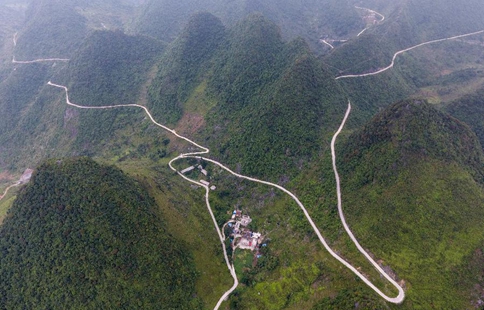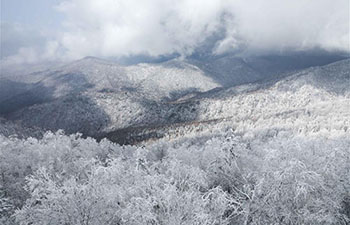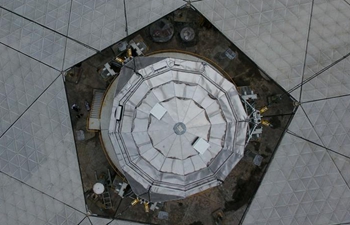KUNMING, Oct. 13 (Xinhua) -- Scientists and collectors are arriving in the city of Shangri-La in southwest China's Yunnan Province, to search for meteorites after a fireball was seen in the area on Oct. 4.
The fireball was a bright meteor that entered the Earth's atmosphere at a velocity of 14.6 kilometers per second and carried an impact energy equivalent of .54 kilotonnes, according to NASA.
Meteor fragments, or meteorites, are sometimes recovered on the ground after fireball sightings.
The fireball has driven up the price of meteorites being sold on China's e-commerce websites such as Taobao.com.
One online store is selling what it claims to be "Shangri-La meteorites" at a price of 30,000 yuan (4,560 U.S. dollars) per gram. Some other shops are selling bracelets allegedly made of the meteorites.
The provincial trade and industry bureau has asked its branch in the Tibetan Autonomous Prefecture of Deqen, which administrates the city of Shangri-La, to monitor online stores based in the region.
"We warn private collectors and consumers not to buy so-called 'Shangri-La meteorites'. They must be verified by scientists to be confirmed as a meteorite," said Mao Wenguang who is in charge of online sales supervision at the bureau.
The Shangri-La municipal government has ordered township-level authorities to search for meteorites. No findings have yet been reported.
Li Jinhua, head of Nixi township, said after the fireball was seen, minor tremors were felt in the area. Some villagers thought it was an earthquake or a fireworks display, he said.
The meteor was seen on the night of Mid-Autumn Festival, when many Chinese traditionally view the full moon.
Li said he immediately requested township and village officials make door-to-door visits to inform residents of the meteor.
"We have ordered local authorities to investigate whether the fireball had caused any fires and damage, however, none have been reported," said Chen Yongping, an official with the municipal government.
Li said scientists and collectors have come to search for meteorites.
"They are teaching villagers how to identify meteorites, and have asked locals for photos and videos of the fireball on Oct. 4. They have offered to provide verification testing if a meteorite is found," said Li.
Wang Xiaobin, a research fellow with the Yunnan Observatory of the Chinese Academy of Sciences, said the fireball exploded at an altitude of around 37 km, making it difficult to locate scattered meteorites on the ground.
"Meteorites are a means for us to learn about planetary substances in the solar system," he said, adding scientists hope to find a sample of the meteorite.
It was not the first time that a meteor has been seen in China. however, ownership of meteorites has aroused heated discussion online.
Some people have said that meteorites belong to the country as Chinese law stipulates all natural resources such as forests and grassland are owned by the country.
Others have argued that meteorites are not a natural resource. They belong to the person who discovers them first, or who owns the land or building they crash into.
"China has no law concerning the ownership of an alien substance such as a meteorite," said lawyer Sun Wenjie. He recommended the government create laws and regulations as soon as possible to prevent smuggling of meteorites.
"No matter who owns it, it is important for China's space exploration and the development of our aerospace industry," said Jin Ziqiang, sociology professor with Yunnan University.

















